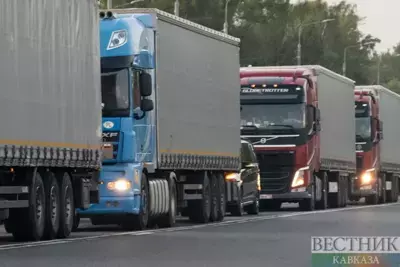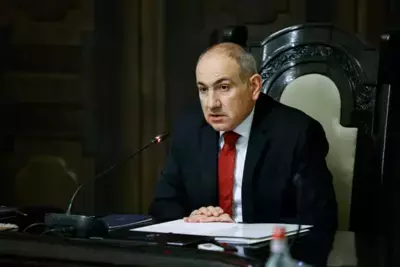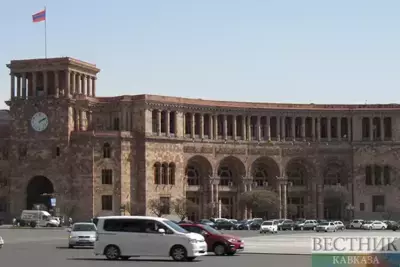Tribune’s guest is the senator from the Republic of Tuva, a member of the Federation Council Committee for Social Policy. Continued. Konstantin Kosachev: "It's not the rigidity of punishment we need to use against terrorists, but its irreversibility"
- Is there a possibility of a lifting of the sanctions against Russia under this general mood of combating Daesh (Islamic State)? Part of the Russian defense industry is under EU sanctions, and their removal would have been logical, if we are talking about some kind of broad coalition. In your opinion, which option, to renew or not renew the sanctions, is available in January next year?
- In my opinion, the issue of anti-terrorism straggle and the issue of sanctions are in parallel, non-intersecting lives. The urgency of lifting the sanctions has been obvious for a long time. When the sanctions were introduced, the calculation was that Russia would quickly surrender, that we would not sustain the pressure, that civil society would distance itself from the actions of the president, in this case according to Ukraine, like, good cheese disappeared from the shops, so the president was wrong. This was a naive reliance on the state of mind, at the maturity level, or rather immaturity, of Russian society. That did not happen, the attempt to divide society, antagonize society in relation to the collapse of the authorities. The consolidation is unprecedented in history! It is not far-fetched, it is not sucked from the finger, these are the real figures, when they say that the president now enjoys the support of almost 90% of the population. These figures are not comparable with those that existed before the Ukrainian crisis. The dynamics is uniquely positive.
As for the economy, yes, there are problems, yes, it is not so simple, but go ahead. In many ways, the sanctions are working in a plus, not a minus. Would it not be a blessing in disguise. The sanctions forced us to mobilize, to start reforms, they have been started. I think our opponents see it clearly. They understand that it is impossible to maintain the sanctions endlessly.
They have put forward their demands –to return the Crimea to Ukraine – which is unenforceable by definition, Russia would never comply with it, no matter what is happening in the economy, no matter what is taking place in society.
Our opponents see this. I think they started to seek a getaway to save their reputation before the last round of tension on the issue of terrorism. For six months no one connects the southeast of Ukraine and the Crimean issue. ‘Crimea’ is not heard either in conversations or in any resolutions. The condition for the lifting of sanctions is a realization of the Minsk agreements. This is a normal issue, and we are interested in the fact that the Minsk agreements are to be implemented, we are allies in this sense.
- Western journalists have become critical, speaking about the Ukrainian authorities ...
- The chance to review the sanctions policy is high. I suspect that the Ukrainian leadership understands this, though it is trying consistently to sabotage the Minsk agreement to keep its Western allies on the positions of the continuation of the sanctions. But Ukraine is in a growing solitude in this sense. The European Union and the United States have accumulated an understanding that Ukraine due to antagonism to Russia is trying to solve its own problems, falling on bail for the West. This is getting boring.
Therefore, I think that sanctions will gradually wear off and the period when they will be completely removed after the agreement will be implemented in Minsk is not far off. The implementation of the agreements depends on Kiev, not on Donetsk and Lugansk. I think that the pressure on Kiev in this regard will increase. But once again, it is a process that develops its own logic and which, in my opinion, cannot be linked directly to the building of an anti-terrorist coalition. Maybe it's good. Let these two issues not interfere with each other. Now it is much more important for us to establish cooperation on anti-terror measures, because it is a situation that could explode at any time, any day. Time is working against us.

- Following the introduction of the sanctions, Russia has intensified relations with China and Iran, there was a rapprochement with the countries of the post-Soviet space. Can the integration of Russia and the Caucasus be closer, to which, in this case, a direct route to Iran opens?
- If we could discard the policy, there would be no limits for such cooperation. But the policy interferes for a while. There are internal divisions in the South Caucasus-Armenia-Azerbaijan conflict, a conflict between Russia and Georgia. There is a consistent preference for the bilateral cooperation instead of multilateral by Azerbaijan, which is wary of the integration processes, including with the Russian participation, whether the CIS, the Eurasian Economic Union. But there is progress in this direction, because the project is getting on its feet. Hence, the new interest appears.
The situation in the South Caucasus is dynamic. Russia has never (unlike the US or the EU) put a partner in the position of either / or - with us or against us. We have tried to apply this often with the same Ukraine. I remember when the Czech Republic, Slovakia, Bulgaria, which is also dependent on Russia, particularly in the field of nuclear energy, because nuclear power is still dependent on Russian gas, were entering the EU. Then it was managed to overcome this geopolitical pass because civilized, early and professional consultations were organized. Of course, we never liked the fact that these countries entered the European Union, in which Russia does not participate, but we have never dramatized the situation. Moreover, the membership of these countries in the European Union took place without serious consequences for the interests of our bilateral relations, provided that we had spoken and organized everything in advance. The issue of the Ukrainian European association, too, could go differently, if the EU would have been wiser not to drive Russia away from this dialogue, if the Ukrainian leadership would be smarter at all previous stages.
- Speaking about the Caucasus, Georgia has always tended to NATO, and Azerbaijan has always stepped aside such proposals. Neither did Azerbaijan support the sanctions against Russia, despite the political and economic pressure from the West. Azerbaijani President Ilham Aliyev was invited to participate in the G20 summit in Istanbul. How do you evaluate his participation in the summit?
- Only positively. The G20 format is interesting, because it consists of completely different countries. Why is the G7 – the former G8 – disappearing before our eyes? Because they had a chance to continue only together with Russia. When Russia was artificially excluded, but an interest club consisting of seven states remained. It doesn't represent a variety of interests, approaches, viewpoints. But the G20 does. I think that the G20 can also change the format, the structure, by inviting new members who share the philosophy of the multi-polar world. This is a well-worn term, but it doesn't diminish its importance.
I am welcoming the appearance of such participants as Azerbaijan. I deeply respect the current president of Azerbaijan, who does a lot for the development of bilateral relations with Russia. Being the head of the Russian Cooperation during previous years I had an opportunity to compare the attitudes, the language policies, as well as the attitudes to the Russian language, appropriate educational programs in the former Soviet republics, and I can honestly say that in this sense Azerbaijan stands out for the better. People in Azerbaijan realize that the Russian language is not a threat, but an additional competitive advantage for the citizens of the country, which expands their opportunities. This is a very wise and far-sighted policy.
Russia and Azerbaijan are supporters and allies, as we have mutual understanding about how the world should be developed. The number of like-minded people is increasing. There are some contradictions in the bilateral tracks, but there is an understanding that the world will be stable when we rely on all existing national interests, rather than the separate interests of individual groups of states, for example the G7. So I was very glad that President Aliyev took part in the summit. The summit focused on the two major issues: the fate of Syria and the fight against terrorism. Azerbaijan has its own very interesting point of view in respect of both these problems, which must be heard by the international community.

- You have visited Latin America recently as a member of a parliamentary delegation, where you discussed cooperation with the EAEC and the BRICS. How close could this cooperation be?
- And the BRICS and the Eurasian Economic Union have really gained strength. But we should not repeat the European Union's mistakes, when it sanctioned several waves of enlargement due to political considerations, without thinking about the consequences. There is an absolute consensus in BRICS now in respect of non-involvement of new participants. Only interaction.
The BRICS was formed as a discussion forum, as a community of reformers of international relations. Countries with different interests, histories, traditions, states of their economy, as well as different political systems, united around with an understanding that the world cannot be standardized and cannot be lined up in a row with a predetermined direction of development.
Then, during the next stage, pragmatic and concrete application projects such as the Development Bank and the Poole of reserve currencies started appearing in the BRICS. It works as a part of the G5, and it would be wrong now to immediately include new members while the tempo is increasing.
There are also the concerns of the Eurasian Economic Union. The EAEC, unlike the EEC, was created on the principle of absolute equality of its members. The economies are different, but the powers in the same union are the same. It is a guarantee of success, when nobody feels like a younger sibling, nobody feels like a follower or that something is imposed. Everyone has an ability to slow down any process, have a special position, and disagree with certain decisions.
It's always a problem when 27 EU member states are trying to persuade one. It is more difficult for the EAEC to work in the context of five countries, rather than three. But this does not mean that the EAEC began to work worse. It is just that more penetration into the subject, more analysis and more preparatory work is needed.
The global financial and economic crisis took place during the first year of the EAEC. Recently, we have been in a delegation in Armenia led by Valentina Matviyenko. There was a very interesting and lively discussion in the Parliament, which was attended by representatives of opposition parties. One of them said quite categorically: "I have never supported the EAEC, I've always supported a rapprochement between Armenia and the EU. You see that a year has passed and my position was proved. We haven't noticed any improvements after Armenia joined the EAEC." Then Valentina Matviyenko said: "Who can now say what it would be with Armenia if it had not joined the EAEC in the turbulence of the last year, when many economies just fell flat on their backs?"
It is inconsistent to assess just the first year of the EAEC, which began only on January 1st. It is necessary to take into account the general terms and conditions, the external conditions that exist in the world. The situation is difficult for all countries. But gathering together with the five countries of the EAEC we managed to avoid and get around so many shocks as the storm front because we were together and we help each other."
















